Latest News
Six dead and 39 rescued after tourist submarine sinks in Red Sea, says local governor
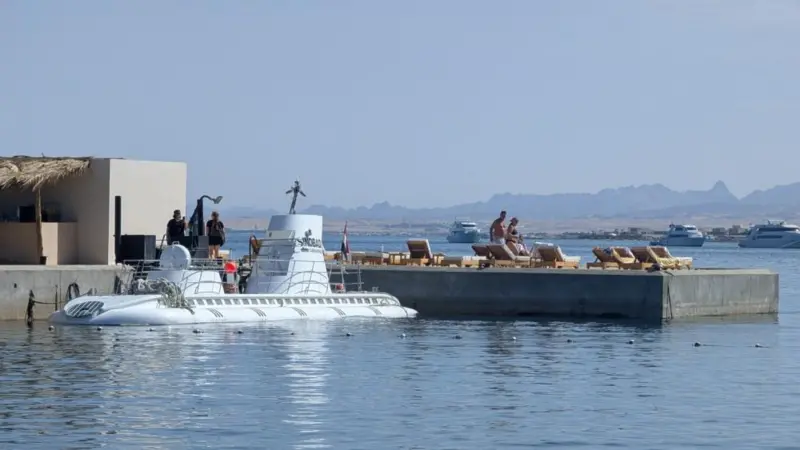
Six tourists were killed and 39 rescued when a submarine sank in the Egyptian Red Sea, the local governor confirms.
The accident happened around one kilometre off the coast of Hurghada The governor says the tourists were from Russia, Norway, Sweden, and India – all six who died were Russian.
A Telegram post from the Association of Tour Operators of Russia, says that according to unconfirmed reports the submarine hit a reef and lost pressure and that the collision happened at a depth of 20 metres (65 feet), the post adds. The company website says it takes tourists to a maximum depth of 25 metres.
The post adds that all excursions and ticket sales for the tours have been suspended, and all other recreational submersible dives off the Hurghada coast have been cancelled.
[BBC]
Latest News
Temporally pause rooftop solar during day time from 13th to 21st April -CEB

The Ceylon Electricity Board has appealed to all rooftop solar owners across the country to voluntarily switch off their solar systems during day time hours (until 3pm each day) from April 13th to 21st to prevent partial power outages or nationwide blackouts which may occur.
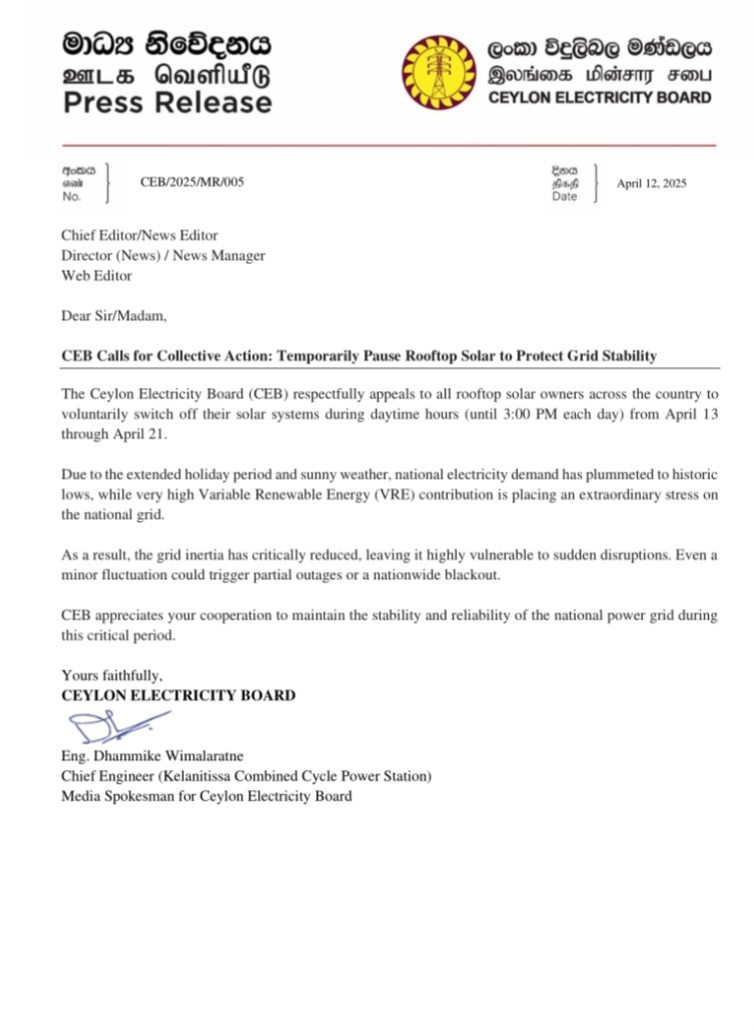
Foreign News
Hundreds of flights cancelled in China as strong winds hit capital
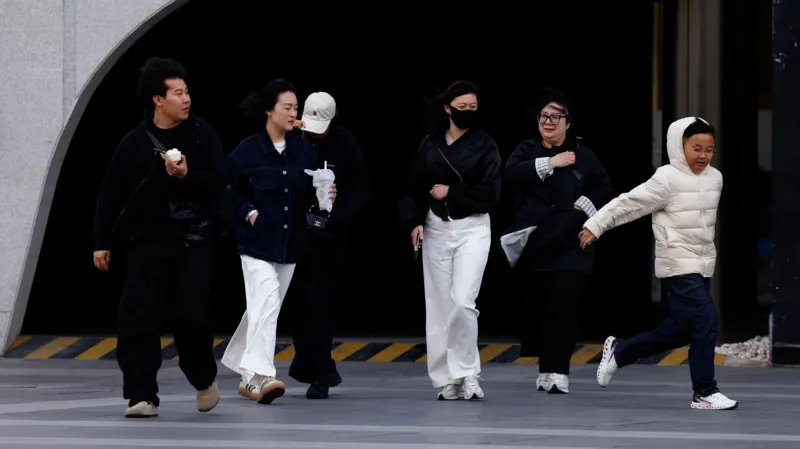
Hundreds of flights have been cancelled and trains suspended as gales hit Beijing and northern China today [Saturday].
By 11:30 local time (03:30 GMT) today, 838 flights had been cancelled at the capital’s two major airports, according to the news agency Reuters.
Wind gusts of up to 93mph (150kph) – the strongest in the Chinese capital for more than half a century – are set to continue through the weekend, forcing the closure of attractions and historic sites.
Millions were urged to stay indoors on Friday, with some state media outlets warning that people weighing less than 50kg may be “easily blown away”.
Train services, including the airport’s express subway line and some high-speed rail lines, have been suspended.
Parks were also shut, with some old trees reinforced or trimmed in preparation – but almost 300 trees have already fallen over in the capital.
A number of vehicles were damaged, but no injuries were reported. In Beijing, most residents followed authorities’ advice to stay indoors after the city warned 22 million residents to avoid non-essential travel.
“Everyone in Beijing was really nervous about it. Today there are hardly any people out on the streets. However, it wasn’t as severe as I had imagined,” a local resident told Reuters.
Meanwhile, a businessman from the Zhejiang province, near Shanghai, had his flight home cancelled.
“Because of the severe winds, all flights scheduled for last night and today were cancelled. So I will probably rebook my flight in a couple of days. I’m now basically stranded in Beijing,” he said.
The strong winds are from a cold vortex system over Mongolia and are expected to last through the weekend.
Winds bringing sand and dust from Mongolia are routine in spring, but climate change can make storms stronger and more severe.
Beijing issued its first orange alert for strong winds in a decade, with the strongest winds expected to arrive on Saturday.
China measures wind speed on a scale that goes from one to 17. A level 11 wind, according to the China Meteorological Administration, can cause “serious damage”, while a level 12 wind brings “extreme destruction”.
The winds this weekend are expected to range from level 11 to 13, with conditions expected to ease by Sunday.
[BBC]
Latest News
Iran says it wants ‘fair agreement’ as nuclear talks with US begin in Oman
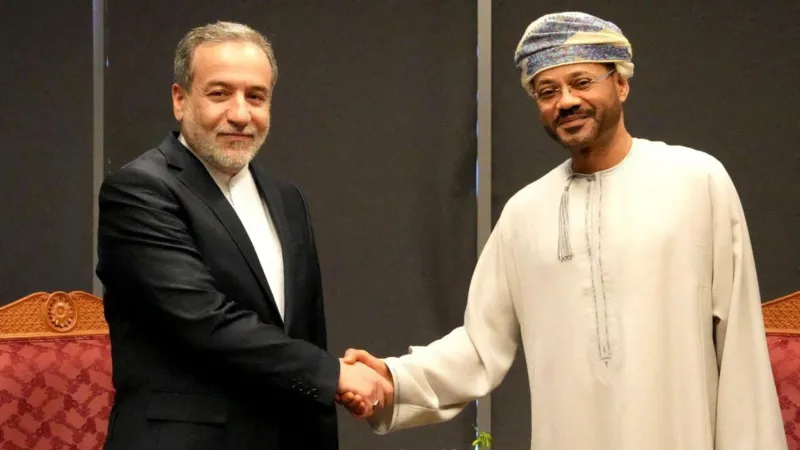
Iran and the United States have begun talks in Oman over Teheran’s nuclear programme – the highest level meeting between the two nations since 2018.
Iran’s Foreign Minister Abbas Araghchi told Iranian state television his country wanted a “fair agreement”, with his spokesperson saying he did not expect talks to last long.
President Donald Trump pulled the US out of a previous nuclear agreement between Iran and world powers in 2018, and has long said he would make a “better” deal.
It is unclear if the two delegations will sit in the same room, but the talks are seen as an important first step to establishing whether a deal can be done, as well as a framework for negotiations.
Araghchi has repeatedly emphasised that indirect talks were best at this stage.
Trump’s envoy Steve Witkoff, who is leading the US delegation, has only spoken of meeting face-to-face.
But the most important issue is what kind of deal each side would accept.
Trump sent a letter to Iran’s supreme leader via the United Arab Emirates last month, saying he wanted a deal to prevent Iran from acquiring nuclear weapons and to avert possible military strikes by the US and Israel.
Iran hopes a deal to limit, but not dismantle, its nuclear programme in exchange for sanctions relief.
“Our intention is to reach a fair and honourable agreement from an equal position, and if the other side also comes from the same position, then hopefully there will be a chance for an initial understanding that will lead to a path of negotiations,” Araghchi said.
He added that the team that came with him was made up of experts “knowledgeable in this particular field and who have a history of negotiating on this issue”.
An unnamed source in Oman told the news agency Reuters that the talks would also seek to de-escalate regional tensions and secure prisoner exchanges.
Trump disclosed the upcoming talks during a visit by Benjamin Netanyahu to the White House on Monday. The Israeli prime minister said on Tuesday that both leaders had agreed “Iran will not have nuclear weapons”.
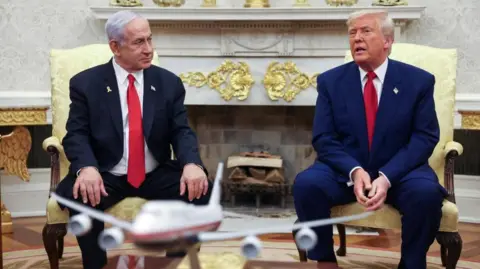
Trump has warned that the US would use military force if a deal was not reached, and Iran has repeatedly said it will not negotiate under pressure.[BBC]
The US president told reporters in the Oval Office on Monday that this weekend’s meeting in Oman would be “very big”, while also warning that it would “be a very bad day for Iran” if the talks were unsuccessful.
Iran insists its nuclear activities are entirely peaceful and that it will never seek to develop or acquire nuclear weapons.
However, since Trump pulled out of the 2015 agreement – which expires later this year – Iran has increasingly breached restrictions imposed by the existing nuclear deal in retaliation for crippling US sanctions reinstated seven years ago, and has stockpiled enough highly-enriched uranium to make several bombs.
Witkoff has also been involved in peace talks on the Russia-Ukraine war, meeting Russian President Vladimir Putin in St Petersburg on Friday.
[BBC]
-

 Business6 days ago
Business6 days agoColombo Coffee wins coveted management awards
-

 Features7 days ago
Features7 days agoStarlink in the Global South
-

 Features2 days ago
Features2 days agoRobbers and Wreckers
-

 Features4 days ago
Features4 days agoSri Lanka’s Foreign Policy amid Geopolitical Transformations: 1990-2024 – Part III
-

 Features7 days ago
Features7 days agoModi’s Sri Lanka Sojourn
-

 Midweek Review4 days ago
Midweek Review4 days agoInequality is killing the Middle Class
-

 Features6 days ago
Features6 days agoSri Lanka’s Foreign Policy amid Geopolitical Transformations: 1990-2024 – Part I
-

 Features5 days ago
Features5 days agoA brighter future …












